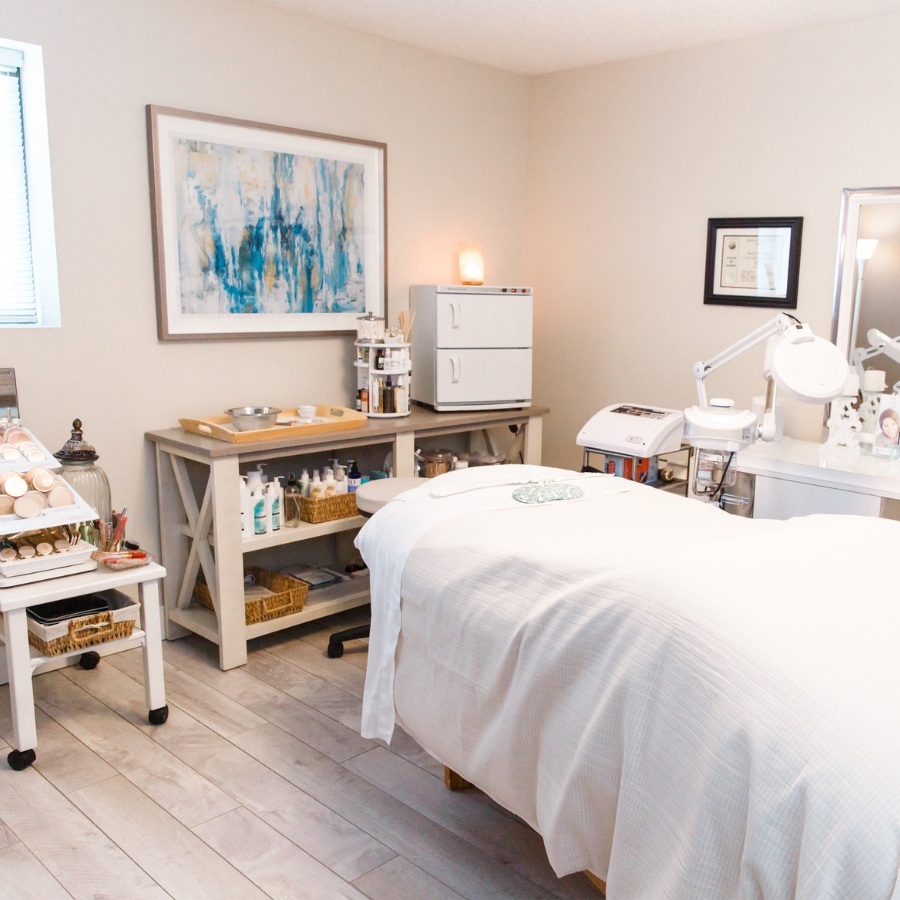Consider the client's perspective: would you be happy to step into this room to begin your treatment? The client must be at ease; treatments can be private at times, and clients are often asked to undress to some degree, which can cause anxiety. Providing a comfortable and safe atmosphere for their treatments will allow them to relax and enjoy it. That is the reason why you need to consider the total look of your treatment room. As the saying goes, “First impressions last.” You better make it a good one!
The look and feel of a facility can make or break a client's decision to return. Here are some tips and tricks for an awesome esthetician treatment room.
Esthetician Room Decor Ideas
Let’s kick it off with some brilliant room decor ideas your clients will love.
- Use a color scheme that is welcoming.
The first move is to choose colors that will make your customers feel welcome. Earth tones, which flow easily, are recommended for this purpose. It's also simple to find other spa decors that go well with these hues.
- Look for appropriate seating.
Even if clients would not be using them for long periods, they should be relaxed. The chairs and couches you use throughout your waiting room and in your business are essential in your room decor.
Make sure the seating complements the overall style of the spa treatments. Don't be cheap; they won't be used for a long time, but they will be used often. Cheap furniture will eventually reveal its condition, so it's best to invest in quality rather than wait until it breaks down in front of a customer. Don't neglect the cushions! Cushions are an excellent way to personalize the spa decor while also enhancing seating comfort.
- Install suitable lighting.
Choose a muted glow over vivid clinical lights for your spa's lighting. Create an aura for your salon decor by lighting it in a complementary manner. Aim for a light that is dim enough for your clients to chill but bright enough for them to read a magazine.
- Avoid offensive artwork displays.
You'd be surprised how many salons think they're being "edgy" when they're being abusive. Art has the potential to divisive. You never know who will come in, whether it's a customer with a small child or a more traditional customer (who isn't afraid to leave a derogatory online review!). Stick to more traditional or abstract art that complements the overall spa decor.
- Use candles that are unscented or with a subtle smell.
We love candles as much as you do. On the other hand, many people’s noses are highly sensitive. Some spas use candles excessively, resulting in disgusting odors that irritate customers.
What you can do is use those tiny battery-operated candles as an option. They will last much longer and save you money. Plus they don’t have any smell. But if you would have real candles in your spa decoration, choose unscented or lightly scented candles. If a client requests a particular fragrance as part of their treatment, it is, of course, essential.
Why Is It Important to Decorate Your Spa?
First and foremost, decorating your spa ensures the right first impression. It becomes a precious asset for customers to come back. It increases the likelihood of customers’ overall satisfaction journey.
A spa concept should be considered an essential component of your market position and brand message.
The foundation of a great spa design is a strong understanding of your purpose, philosophy, and program. This could then influence the design elements of the spa. Keep in mind that interior design communicates your brand message on a very personal level, as clients interact with your brand through their five senses. Clients should see how clean it is, they should smell its calming aroma, they should hear serene music, they should feel cared for, and they should experience total leisure and solitude.
Also, the secret to guest satisfaction is a spa design solution that considers the form, flow, and function of the entire spa environment, from the entrance layout to the design of a spa room.
Your Branding
Nothing says “unique” than having your awesome esthetician branding!
Do you want to stand out from the crowd of wellness businesses? Here are a few simple tips for bringing your branding to the next level.
Customers can visit your local business as a result of large signage and word of mouth. However, if you want your business to thrive, you must build a strong brand. All, from your visual identity to the way you advertise your spa salon, should be imbued with a sense of brand identity.
Today, we'll go over 5 major branding tips to help you come up with your unique selling point.
- Begin with a stylish logo and a distinct color palette.
You can be as creative as you like with your logo design, just make sure it suits your brand commitment. A darker color palette with gold detailing can convey a sense of luxury if you have high-end skin care treatments and massages. If your wellness center takes a holistic approach, a studio logo with flowy script typefaces and natural illustrations may be more appropriate.
- Make a fantastic website experience.
According to one report, people form opinions about a website in as little as 0.005 seconds, so you don't have much time to make a successful first impression and keep visitors' attention long enough to move them into your sales funnel.
People usually go to a day spa on a whim. The vast majority of them will first visit your website to make an appointment or, at the very least, to learn more about the programs and services you provide (massage treatments, pools, beauty salon, etc.). So to say, your site must be fully functional, easy to navigate, pleasant, and with relevant content.
- Enhance the spa experience with customer-oriented interior design.
Maintain a clean, minimalist interior for your spa business, and incorporate natural elements such as plants, fountains, and wood if possible. A touch of nature helps clients to relax and unwind.
- Make good use of Social Media
It may seem to be a dull point, but remember how important social media marketing is right now. Social media accounted for 45 percent of the global population in 2019. When you exclude those that are too young or too old, you'll find that almost half of your potential customers are on social media.
Matching Colors With Walls And Furniture
The walls and the room’s main contents — the furniture must demonstrate a cohesive color match. So to speak, here’s how you can match furniture color with the wall.
- Focus on one color. To create a cohesive room, start with the furniture, which will be the real focus of color matching. Although furniture comes in a wide range of colors and designs, the room's furniture should be connected by a single focus color. This color would then be matched to the room's walls.
- Contrast and complement. You have two choices when it comes to matching your key furniture color to your wall color: contrast or complement. Both options are feasible, but each has its own set of risks.
In interior design, contrast theory refers to the luminance (or color) contrast of objects as well as the positioning of opposing elements or effects in a space. Using a complementary color to the predominant colors in your space will draw attention to it while keeping the design flowing. If orange is the dominant color in your piece, go with blue, which is the color directly opposite on the color wheel.
- Consider the room size or space. Although color combinations may appear to be perfect on paper, implementing the design in your space may be more difficult. According to color psychology, the color of the walls has a major impact on the perceived and actual size of a room. Dark shades, on the other hand, make a small space look even smaller. However, when a wide room is illuminated in light colors, it looks even larger.
- Apply color schemes and accents. You should not feel obligated to paint the entire room the same color without realizing how different colors could appear in the room. Using various shades of the same color to help with room design can be beneficial. A lighter or darker accent color may be used to achieve this. This helps to keep color matching under control by ensuring that the colors used aren't overpowering. After all, the aim is for your furniture and walls to complement each other rather than overshadow each other. This distinct color can also be used in tandem with stripes and other patterns in the space.
Common Decoration Tips
Take a peek at some basic tips that are so helpful but are usually taken for granted.
- Your place should have a specific style.
- Every room needs an accent wall.
- Look for inspirations in design sites or magazines.
- Accent pillows should be present in every seating.
- Every room needs a mirror.
- Comfort over style.
- Never wallpaper if you can paint.
- Carpeting makes spaces look more cohesive.
- Furniture should be pushed against the wall.
- Every wall needs something on it.
Decoration Elements
These are key components you need to consider in decorating your room, to avoid overboard and insignificance. When designing or decorating an esthetician’s space always remember to satisfy the clients’ five senses.
- Space
Space should evoke tranquillity, so all elements must be in order and harmony. Materials widely used include wood, natural stone, glass, and marble; it is also important to consider orientation, light, and environment; natural landscapes and gardens designed specifically for this purpose are the most suitable.
- Color
As you might be aware, certain colors affect people's moods. Blue is recommended for transmitting a sense of relaxation, while light green is recommended for transmitting a sense of balance. Yellow and orange are often used in reception areas and clothing to reflect enthusiasm and optimism.
- Light
Light influences people's relaxation, which is why we prefer using dimmable lighting or candlelight; the flickering invites relaxation and is a pleasant way to create an intimate atmosphere.
- Temperature
The temperature in the room should be comfortable for the client. Not too hot and not too cold, just balanced. Space should be well ventilated.
- Aroma
The design of the Spa must allow adequate air circulation, which encourages ventilation and allows customers to enjoy the different scents used during treatment. Diffusers, scented candles, and burners can all be used to produce these scents.
Esthetician Treatment Room Ideas
Before delving into real-life examples or ideas for your treatment rooms. The first thing you should do is put yourself in a client’s shoes. Experience for yourself the client’s journey your spa or business provides.
The Client’s Journey
Conducting a client trip now and then is also a good long-term strategy. Sit in the lounge and make some observations as if you were a customer. Then go to the room and place your belongings where the client can bring them, then lie down on the bed (something we don't always do, but it gives you a completely different perspective of the room and you'll notice stuff you didn't notice before!).
Make a note of anything that seems to be dusty or in need of repair; maybe there's some wax on the walls that you didn't notice before, or the paint might use a refresh, or a shelf has become wobbly. There could be a few things missing, or you could invest in a wicker basket or coat stand if you don't have a suitable place for the clients' belongings. If things are looking a little bare, add a poster or photo, as well as a few nice touches like nice antique style mirrors or whatever fits in with your salon theme. Check to see if the décor is new and not out of date; is it still representative of your salon's brand, and is the color scheme working well? If you find that you are no longer enjoying it as much as you once did, it might be time for a makeover.
Taking the time to think like your client will help you appreciate what it's like from their perspective, and if there's something that can be improved, you'll do so to hopefully make your clients happy and keep them coming back for more!
So much for that, here’s the most awaited part of decorating a place — getting inspiration from beautiful esthetician treatment room ideas!



































